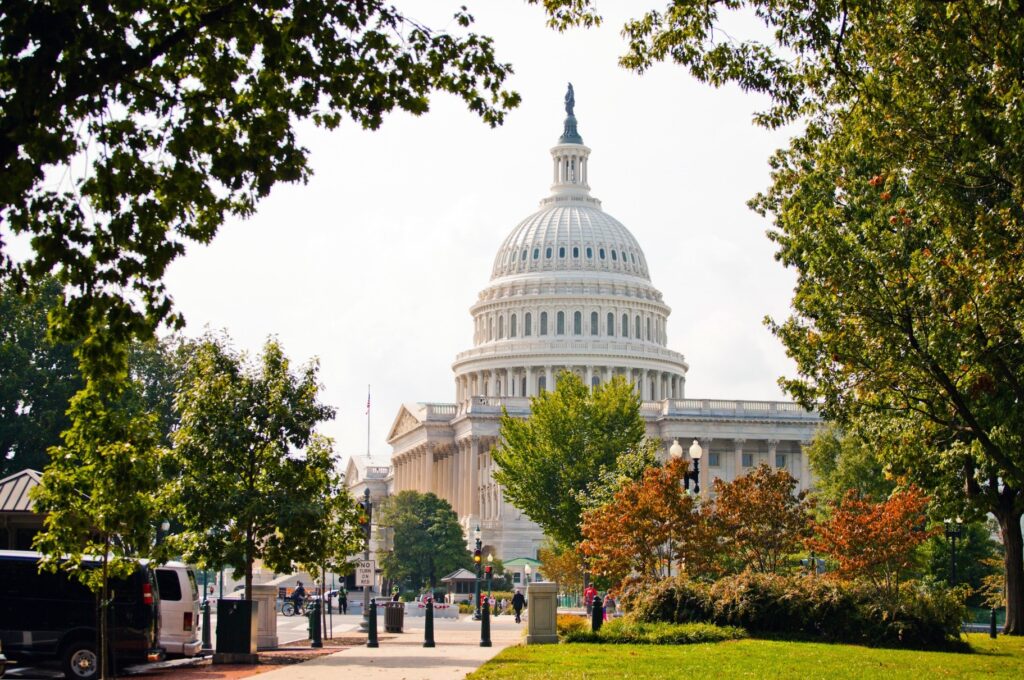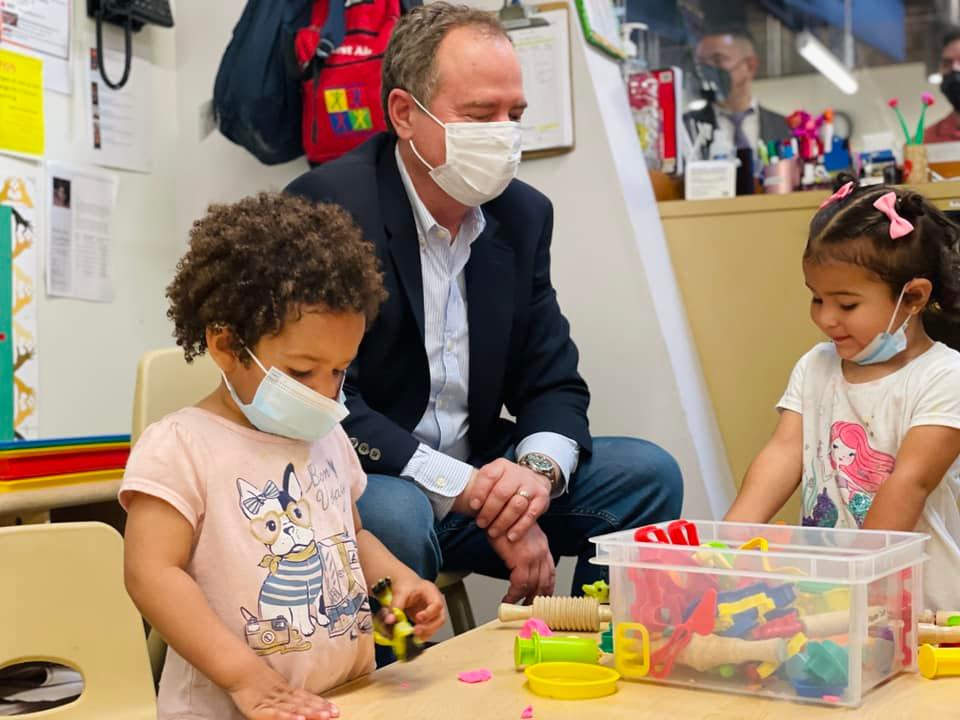NHSA’s State and Regional Network
Throughout the year, the national Head Start Associations convene the Head Start State and Regional Network to support the goals of the Head Start community. The mission of the Network is to build collective power to protect and expand access to Head Start and Early Head Start while continuously strengthening program quality, developing supportive state and local partnerships, and exerting ECE leadership.
-
Shared Advocacy
-
Policy, Data, and Innovation
-
Leadership Development and Partnership Engagement
-
Technical Assistance
-
Connections to Capitol Hill and D.C.
Shared Advocacy
Easing the enrollment burden on eligible families through Head Start-SNAP alignment
In June 2021, all 50 state associations and D.C. and all 12 regional associations signed onto a letter to the Secretary of Health and Human Services, requesting the Administration use existing authority to enable enrollment in the Supplemental Nutrition Assistance Program (SNAP) to count toward eligibility for Head Start. After robust follow-up advocacy, in April 2022, the Administration made this important change to simplify access for already eligible families and expand eligibility to more food insecure children. Within two months of the change, over 30 state associations participated in implementation planning with NHSA partner, the Food Research and Action Center (FRAC). Associations are currently working to develop supportive memorandums of understanding with state SNAP agencies and sharing NHSA’s SNAP Eligibility Implementation Toolkit.
SNAP Eligibility Implementation Toolkit
NHSA has designed a toolkit to support implementation of the SNAP eligibility change in Head Start and Early Head Start programs.
Raising our voices for common sense COVID-19 regulations that protect child access
On December 27, 2021, NHSA, 48 state associations, all 10 regional associations and the National Indian Head Start Directors Association joined forces in a comment letter stating the field’s concerns with an Interim Final Rule mandating staff COVID-19 vaccination and child masking. Consistent with Head Start’s commitment to child and staff safety within a local control framework, the comments called on the Office of Head Start to allow “specific, finite waivers or locally designed solutions based on local data that balance safety with local circumstances and realities that enable children to retain access to transformative services.” The comment letter built on a December 17, 2021 letter to the Secretary of Health and Human Services and the results of an NHSA survey estimating the full application of the rule could lead to Head Start programs losing up to 26% of staff and the closing of 1,300 classrooms.
Fighting for fair compensation for the Head Start workforce
Across the Spring of 2022, in response to the burgeoning workforce crisis within Head Start and Early Head Start programs, NHSA partnered with 14 strategically-important state Head Start associations on a multi-part strategy that included tailored data collection and direct lawmaker conversations, a national grassroots action that generated over 12,900 communications to Members of Congress, the release, dissemination and news coverage in The Hill, Politico and other outlets of a new NHSA report quantifying the depth of the crisis, Confronting Head Start’s Workforce Crisis, and witness testimony by Lori Milam, Executive Director of the West Virginia Head Start Association. NHSA and our state and regional partners continue to fight for $2.5 billion in annual workforce realignment funding to halt and reverse this crisis.
Confronting Head Start’s Workforce Crisis
Between low compensation, challenging job conditions, and better opportunities with better pay, the Head Start workforce is in crisis.
Policy, Data, and Innovation
Urging Congress to “start with Head Start” in universal pre-K legislation
A new Administration brought with it an ambitious new vision to expand early childhood education. To influence the debate, on September 9, 2022, NHSA convened over 500 stakeholders on a webinar to hear from three distinguished researchers about the importance of centering the Head Start model: Dr. Shantel Meek, Founding Director, Children’s Equity Project, Dr. Walter Gilliam, Director, Edward Zigler Center in Child Development and Social Policy, Yale University and Dr. Iheoma Iruka, Founding Director, Equity Research Action Coalition, The University of North Carolina at Chapel Hill. Post-webinar, through 40 state association survey responses and multiple conversations with state leaders, ideal provisions that already worked in states were developed for Congress’ consideration. A coalition letter from 14 leading equity-focused partners, including the National Black Child Development Institute and UnidosUs, was later issued. The House-passed version of the bill included most NHSA recommendations.
Uniting behind research-based solutions to increase equitable access
In April 2022, NHSA released a report rigorously cataloging the top barriers to access to Head Start for children and families. The report, produced in partnership with Voices for Healthy Kids, was the product of nine months of engagement with a national working group of leading equity experts and organizations, a deep dive into four states (Alabama, Louisiana, Mississippi and New Mexico) in partnership with their state associations and Collaboration Offices and a full-field survey with 2,300 responses. The report’s recommendations included a set of strong state policies, including expanded Early Head Start and family child care partnerships. Over 1,000 stakeholders attended virtual presentations and discussions to engage with the findings.
Policy Brief: Start with Head Start
Expanding Head Start’s model must be the top policy priority of any expansion of universal pre-kindergarten.
Sorry, we couldn't find any posts. Please try a different search.
7 key barriers to equitable access to Head Start were identified
A lack of transportation and outdated geolocation of center-based care
Various family socio-economic issues related to living in poverty, including housing instability, frequent moves, and an inability to be contacted reliably
Low income eligibility limits and a lack of subsidized alternatives
A lack of overall supply, especially of birth-to-three Early Head Start slots
Inadequate hours of service for some Head Start families
A workforce crisis, including hiring challenges, turnover, and difficulty finding the right staff
A lack of parent awareness of Head Start’s services and a perceived bias for school-based services
Raising the profile of Early Head Start in states
Only 1 in 10 income-eligible infants and toddlers are able to access Early Head Start. In March 2022, in partnership with NHSA’s Early Head Start Rising initiative, state Head Start associations in Hawaii, Maryland, New Jersey and New York released policy agendas to support expansion of the Early Head Start model in their states to meet unmet need for high-quality infant and toddler care. The policy agendas were aided by a fall NHSA issue brief, “Helping States Meet Their Goals for Pregnant Women, Infants, Toddlers and Families through Early Head Start.” Earlier in the year two other state Head Start associations–Georgia and Pennsylvania–released detailed data dashboards to highlight the range of Early Head Start services in their state and unmet need.
Bringing together prenatal-to-three leaders across 20 states
On February 3, 2022, representatives from 20 states met to hear about current issues and concerns in Early Head Start and explore federal opportunities with NHSA and guests from ZERO TO THREE and the Center for Law and Social Policy (CLASP). Significantly, participants heard about robust Early Head Start and Early Head Start-Child Care Partnership advocacy and practice-oriented work from the Wisconsin Early Childhood Association, Wisconsin Head Start Association, Wisconsin State Head Start Collaboration Office and Wisconsin Department of Children and Families.
Expand Early Head Start by adding child care rooms in Head Start/Early Head Start programs providing wrap around or extended day child care by encouraging programs to use federal and state Head Start funding to expand Early Head Start slots..."
—Raising Wisconsin 2022 Policy Agenda
Leadership Development and Partner Engagement
Building muscles to advance equity in state policy
Between January and April 2022, NHSA partnered with the BUILD Initiative to host a seven-part Equity in State Policy Series for Network members. In all, Network members engaged in 453 hours of collective professional development on topics ranging from reducing disparities for infants and toddlers and incorporating home and native languages other than English. Eighty-seven (87) percent of participants found they “deepened their knowledge and skills at engaging in equity-focused state policy work.” Forty (40) percent noted that the most valuable session was “Rebuilding ECE Systems for Black and Latinx Children with Racial Equity and Quality at the Forefront.” Ninety-three (93) percent recommended the series become an annual professional development opportunity.
Deepening expertise through dialogue with allied and innovative early childhood organizations
At the Network’s monthly “Workshop” call, state and regional leaders interacted with leading voices in early childhood policy and practice. Among the innovators that engaged with the Network:
-
June 2021
SchoolHouse Connections shared strategies to maximize the use of new federal COVID relief funding to support young children experiencing homelessness.
-
March 2022
Prenatal-to-Five Fiscal Strategies, about how new tools and methodologies can be used to increase per-child funding and pay for the true cost of care in child care and Head Start; and
-
April 2022
The Mary E. Walsh Center for Thriving Children at Boston College discussed and shared data about their innovative approach to expanding access to holistic whole child/whole family services in K-12 and early childhood settings;
Sharing selflessly through peer-to-peer exchange on Early Head Start, racial equity and collaboration. Network peers gave valuable time and effort to share their successes, challenges, strategies, tactics, messaging and the like, to support peer effectiveness.
Among the most notable peer sharing:
Technical Assistance
Sharing selflessly through peer-to-peer exchange on Early Head Start, racial equity and collaboration. Network peers gave valuable time and effort to share their successes, challenges, strategies, tactics, messaging and the like, to support peer effectiveness.
Among the most notable peer sharing:
Connections to Capitol Hill and D.C.
State Captains bring Head Start to the Hill
Across our Fall and Winter Leadership Institutes in Washington D.C., NHSA worked with 58 “state captains” from among state and regional association leadership to organize 192 virtual meetings with Members of Congress or their staff. These meetings brought the voices of Head Start to key decision makers on Capitol Hill in force, highlighting the services and outcomes that programs delivered during the pandemic while emphasizing the need for expanded workforce funding, access to Early Head Start and modernized eligibility.
Fall Leadership Institute
NHSA’s Fall Leadership Institute is a four-day deep dive into the policy and advocacy issues that will impact Head Start for years to come. The Institute will take place September 15 – 18, 2025 in Washington D.C.
Program Visits: A Powerful Way to Illustrate the Value of Head Start
Over the last year, from California to Connecticut, dozens of Senators and Representatives have made a Head Start program visit.
Maximizing program visits from Members of Congress
Members of Congress are frequent guests at Head Start and Early Head Start programs, which are critical beacons of education and opportunity in their districts and states. In the past year, NHSA provided tailored support to Head Start associations and programs. Key support was provided for on-site meetings with Sen. Elizabeth Warren (D-MA), Reps. Suzanne Bonamici (D-OR-01), Rosa DeLauro (D-CT-03), Sara Jacobs (D-CA-53), and Susan Wild (D-PA-07), along with staff from the offices of Sen. Jerry Moran (R-KS) and Rep. Mike Carey (R-OH-15).
Bringing D.C. to State Association Conferences
In the past year, NHSA’s Deputy Director Tommy Sheridan has spoken at over 20 state or regional association conferences virtually and in-person, to bring the voice of NHSA and happenings in D.C. directly to Head Start programs and staff and hear more about their needs and concerns. Notably, the past year included a discussion with the Michigan Head Start Association about the scale of the challenges facing programs, especially workforce, SNAP and connections between state pre-K and Head Start. In Idaho, a virtual gathering involved assisting with training of parents and enhanced advocacy.



